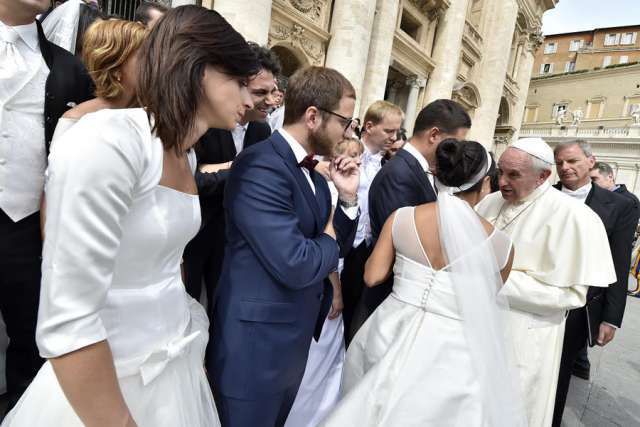Vatican City, Feb 25, 2017 / 05:18 am (CNA/EWTN News).- On Saturday Pope Francis told a group of parish priests training on the new marriage annulment process to place strong emphasis on good preparation that isn’t limited to just a few courses, but extends even to the first few years after marriage.
“I ask myself how many of these youth who come to marriage preparation courses understand what ‘marriage,’ the sign of the union of Christ and the Church, means,” the Pope said Feb. 25. “They say yes, but do they understand this? Do they have faith in this?” he asked, and voiced his conviction that “a true catechumenate is needed for the sacrament of marriage.”
Part of this formation process he said, means being thorough, not “to make preparation with two or three meetings and then go forward.” During marriage prep, couples must be helped to understand “the profound meaning of the step that they are about to take.” This support must also continue through the celebration of marriage itself and even through the first years after, he said.
Marriage, he said, “is the icon of God, created for us by him, who is the perfect communion of the three persons of the Father, the Son and the Holy Spirit.” The love of the Trinity and Christ’s love for his bride, the Church, must therefore be “the center of marriage catechesis and evangelization.” Whether it’s through personal or communitarian encounters, and whether they are planned or spontaneous, “never tire of showing to all, especially to spouses, (the) great mystery” of God’s love, he said.
The Pope spoke to priests participating a formation course for the Tribunal of the Roman Rota, the Holy’s See’s main court, dedicated to the new marriage annulment process, which went into effect Dec. 10, 2016. Held in Rome, the course ran from Feb. 22-25, and was closed by an audience with the Pope. The course follows a similar one held in March 2016, but which was directed specifically toward bishops.
In his speech, Francis said priests have a twofold responsibility when it comes to marital ministry: to always bear witness to the beauty of marriage, and to be a consistent support to couples, regardless of their marital status. He noted that priests are often “the first interlocutors” of young couples who want to get married, and are also the first ones these couples go to when problems or crisis come up, including the request for an annulment of their marriage.
Faced with so many “complex situations” affecting families today, “no one knows better than you and is in contact with the reality of the social fabric in the area,” experiencing firsthand the complexity of various situations they encounter, including valid sacramental marriages; domestic partnerships; civil unions; failed marriages and families and youth, both happy and unhappy. “For each person and each situation,” he said, “you are called to be travel companions in order to bear witness and to support.”
The Pope stressed that a priest’s first concern is that of “bearing witness to the grace of the sacrament of marriage and the primordial good of the family” by proclaiming that “marriage between a man and a woman is a sign of the spousal union between Christ and the Church.”
This witness is also shown when accompanying young couples on their journey “with care,” showing them how to live in times of “light and darkness, in moments of joy and those in fatigue,” always showing the beauty of marriage. Francis told the priests that while bearing witness to the beauty of marriage, they must also care for and support “those who realize the fact that their marriage is not a true sacramental marriage and want to leave this situation.”
Because of the “delicate” nature of this type work, the Pope said priests must do it “in such a way that your faithful recognize you not so much as experts in bureaucratic actions or judicial norms, but as brothers who place themselves in an attitude of listening and understanding.” He told them to imitate “the style” of the Gospel by meeting with and listening not only to engaged or married couples, but also youth who prefer to cohabitate rather than getting married.
People in these situations “are among the poor and little ones toward whom the Church, in the footsteps of her master and Lord, wants to be a mother who never abandons but who draws near and cares for them,” Francis said. “Even these people are loved by the heart of Christ,” he said, telling priests to “have a gaze of tenderness and compassion toward them.”
This type of care and attention “is an essential part of your work in promoting and defending the sacrament of marriage,” the Pope said, adding that the parish is the place “par excellence” for the “salus animarum (salvation of souls).”
Pope Francis then pointed to a recent speech he gave to the Rota in which he told them to implement “a true catechumenate” of future spouses which covers all stages of the sacramental path, from the time of marriage preparation, the celebration of the sacrament and the first years immediately after. “To you pastors, indispensable collaborators of the bishops, is primarily entrusted this catechumenate,” he said, and encouraged them to implement it “regardless of the difficulties you could encounter.”
Francis closed his speech by thanking the priests for their commitment to announcing “the Gospel of the family.” He prayed that the Holy Spirit would help them “to be ministers of peace and consolation in the midst of the holy faithful people of God, especially the most fragile and those in need of your pastoral support.”

